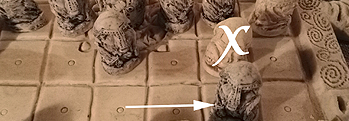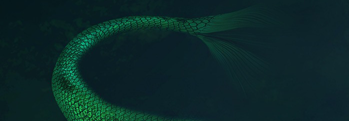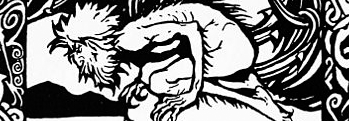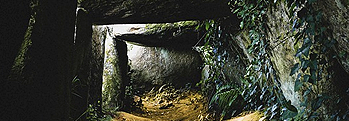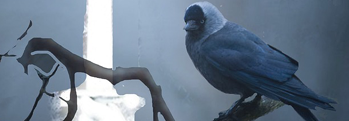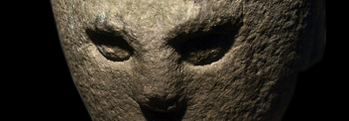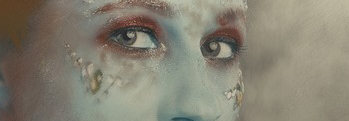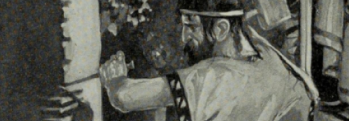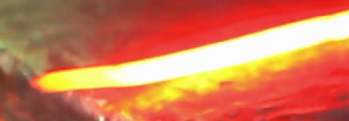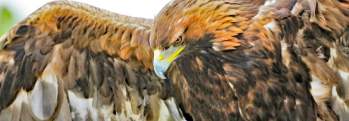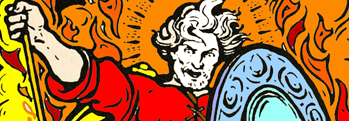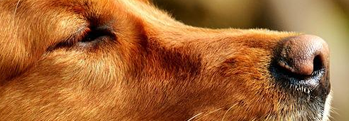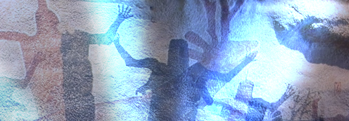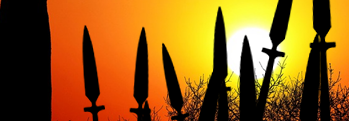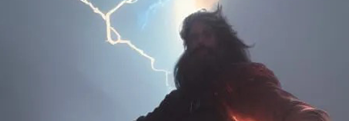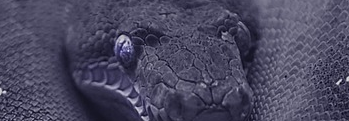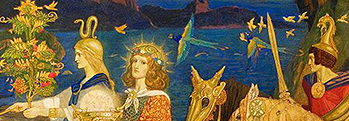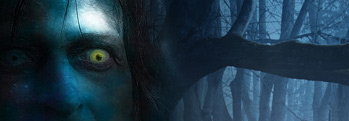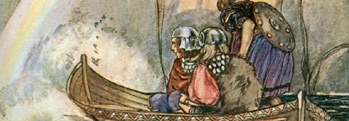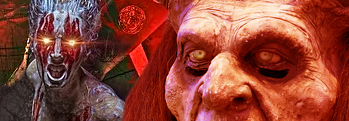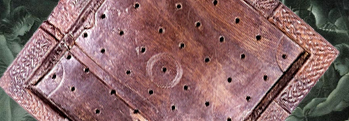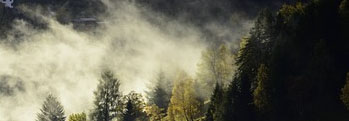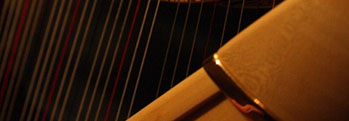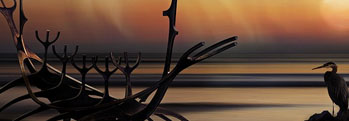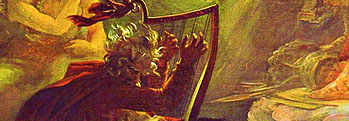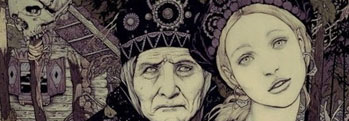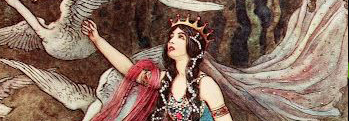Spirits of War
Irish and Celtic myths and legends, Irish folklore and Irish fairy tales from the Mythological Cycle
The Fearsome Bocánaigh and Bánánaigh Who Plagued Ancient Battles
 Some of the most ancient Irish myths and legends tell of the Bocanachs and the Bananachs, known to the people of Ireland as fierce spirits of the air that were drawn to scenes of battle and bloodshed. Whenever armies gathered to test their might, the sky overhead would be filled with shrieking demons dancing to the sounds of swords clashing and bloodshed.
Some of the most ancient Irish myths and legends tell of the Bocanachs and the Bananachs, known to the people of Ireland as fierce spirits of the air that were drawn to scenes of battle and bloodshed. Whenever armies gathered to test their might, the sky overhead would be filled with shrieking demons dancing to the sounds of swords clashing and bloodshed.
They seem to have come to Ireland, or at least been awoken in Ireland, by the Tuatha Dé Dannan, who called upon them to unnerve and frighten their enemies, but once unleashed, they don't go away so easily!
The Bocanachs or Bocánaigh in Irish were related to the Pucas, who might be their descendants or themselves weakened with the passage of time and the coming of Christianity, having the heads of goats which lapped up the blood of the fallen, and they weren't particular about whose blood was spilled either! Some say they would even whisper in the ears of kings and chiefs to incite discord and war.
They were joined in their dreadful feasts by the Bananachs or Bánánaigh, which meant white or female wraiths, and they in turn were related to the Banshee, although the Banshee merely prophecised death rather than flitting over fields of combat.
The Bananachs were also said to be close cousins of the Morrigan and the Badbs, and they always appear alongside the Bocanachs, some even sitting on the shields and blades of heroes as they fought, the better to see what was happening!
They are spoken of in the epic Irish tale of Táin Bó Cuailnge howling and swooping over Cú Chulainn when he fought his friend Ferdiad for three days at the ford Áth Fhirdiad in the river Dee.
“So close was the fight they made now that their heads met above and their feet below and their arms in the middle over the rims and bosses of their shields. So close was the fight they made that they cleft and loosened their shields from their rims to their centres.
So close was the fight which they made that they turned and bent and shivered their spears from their joints to their hefts! Such was the closeness of the fight which they made that the Bocanachs and Bananachs and wild people of the glens and demons of the air screamed from the rims of their shields, and from the hilts of their swords, and from the hefts of their spears.
Such was the closeness of the fight which they made that they cast the river out of its bed and out of its course, so that it might have been a reclining and reposing couch for a king or for a queen in the middle of the ford, so that there was not a drop of water in it unless it dropped into it by the trampling and the hewing which the two champions and the two heroes made in the middle of the ford.”
The scene of this great battle can be found on the map below.
More Stories from the Mythological Cycle
The Irish love music, and it has long been said that the Irish race lived and breathed melodies, liable to burst into song at the drop of a hat. Few realise how far back the Irish musical tradition goes however - at least as far as we know! Some of the earliest musical instruments which have been uncovered date from the Irish Bronze Age, in thos ... [more]
During the Irish bronze age, the working of gold reached heights never before seen or dreamed of. Goldsmiths fashioned the soft, luminous metal into intricate forms resembling cloth, cord, the rising and falling hills of Ireland, and many other striking designs. Among their most famous and beautiful creations were the astonishing gold collars, one ... [more]
The warm, glimmering golden glow of amber, or ómra in Irish, has held deep fascination for people since the Neolithic and probably long before that. Its rich, flowing contours capture and refract the sun and firelight with equal facility, and it may have been one of the first gems worked by human hands. Its beauty has inspired enterprise and ... [more]
This stunning battle-shield, cast from golden-hued shimmering bronze, was originally made during the bronze age. It is one of about two dozen similar shields of varying sizes found across the Irish Isles, and dates back to around 1000 BC. Measuring around 71cm across, it began life as a flat sheet of bronze, which was then hammered over rounded ... [more]
The extraordinary bronze age Irish axehead is remarkable not only for the decorations adorning the axe itself, but also for the carry-pouch or sheath discovered along with it when it was found four meters deep in a peat bog in Brockagh, County Kildare. It is very unusual for any organic material to have survived thousands of years, but the unique c ... [more]
The Lurgan Canoe is one of the earliest boats found in Ireland, dating back four and a half thousand years, made from a single mighty oak tree felled when the first metalworkers began to arrive. This was a time of upheaval, mystery, magic, and wonder, old orders tottering and collapsing, the end of the age of the God-Kings of Ireland with their pon ... [more]
We are delighted to be able to present to you the rules of Fidchell, the Irish game of kings! This game can be purchased, but it's easy to get started and try it out for yourself. All you need is a 7 x 7 board, which can be squares or pins marked out - even on paper - 16 white or attacker pieces, a king piece, and 8 darker-coloured defender pie ... [more]
Times were hard in Ireland not so long ago, and harder yet they were before that – many’s the family was cast out of their houses for being unable to pay their rent! One such was poor Finian O’Toole, the kindly father of nine children who found himself evicted by the cruel English landlord in the parish of Kilmoe. Now it was th ... [more]
There is a tale, one of the oldest stories among the many very ancient stories of Ireland, of a man who returned to life as a man thousands of years after he first walked the earth. His legend was found in an eleventh century manuscript called Lebor na hUidre, which means The Book of Dun Cow, and it was written there by the followers of an early ... [more]
It’s a not uncommon belief that the women of Ireland in the ancient days were quiet and kept to themselves, letting the men do all the great deeds and win all the fame – but nothing could be further from the truth! From that day to this Irish women were and remain wild and fearless, willing to go to lengths as great as any man for victo ... [more]
Of great renown are the feats and deeds of the ancient heroes of Ireland, and still to this day they echo through our legends where such tales are told. But of scarce less fame were the weapons they bore, implements of glory and terror, bound to ancient spirits and clasping lightning within their shimmering length, wielded with scarcely imaginable ... [more]
The Tuatha De Danans By the force of potent spells and wicked magic, And conjurations horrible to hear, Could set the ministers of hell at work, And raise a slaughtered army from the earth, And make them live, and breathe, and fight again. So it was written in Keating's General History of Ireland, considered by many to be the definitive ... [more]
Her name was Clíona or Clíodhna and she was one of the most beautiful women of the Tuatha Dé Danann, that vanished sorcerous race whose legends echo still from one end of Ireland to the other. Some even say she was the most beautiful woman in the world, and she was worshipped as a goddess by the pagans of Ireland who followed t ... [more]
Many are the tales told of Lugh, the mightiest king of that ancient and mystical sorcerer race of Ireland, the Tuatha Dé Danann, but only one is told of his death. Now Lugh, lord of many warriors, had four wives, which back in those days wasn’t too unusual, and their names were Echtach, daughter of white-toothed Dagda, Englec, Ná ... [more]
Just as happens today, people in ancient Ireland had legal disputes and complaints they would bring before their courts, and the judge or king would try to make sense of what had happened and hand down a fair decision. But also just as happens today, there were situations where it was one person’s word against another, or there wasn’ ... [more]
The old stories of Ireland, some of the oldest in the world, tell of great ancients – almost immortals! – whose span of life stretched many thousands of years. Legends tell of their spirits passing from one body to the next, or upon occasion, staying in the one body for millennia, watching the tides of man and beast come and go. Such ... [more]
One of the chiefest and most powerful kings among the mystical Tuatha Dé Dannan was the one called Dagda, or Dagda Mór, which means “of shining skills”. He had other names too, such as Eochu the horseman, Ruad Rofhessa, lord of great knowledge, Dáire the fertile one and Aed, he of the fiery temper. Others yet called ... [more]
The Irish Brehon law codes are said to be the earliest fully developed legal system in Europe, but long before the Brehons were laid down there were earlier laws and all were subject to them, from the lowest to the highest! Women could hold their own property, were not themselves considered property, and could seek an education and improve their ... [more]
No tale of ancient Ireland could be complete without mentioning the Fomorians, dreaded foes of the Tuatha Dé Danann and all who came to conquer Ireland. The meaning of their name is debated even today, although most agree that the first part, fó, means “from below” or “nether” and the latter part means “t ... [more]
Many of the oldest records of Irish mythology and legend, which you might truthfully say are a history of prehistory, tell that the first people to arrive in Ireland were led by the lady Cessair when she fled to this land to escape the coming flood. The idols which had whispered through veils of midnight smoke that Ireland was a land untouched by p ... [more]
Throughout the old stories of Ireland are scattered mentions, and sometimes even descriptions, of some of the spells and rites used by both the Tuatha Dé Danann and those who came after them, the Gaels or Milesians, as they are sometimes known. Tales of these wondrous and mysterious feats of sorcerous skill may seem strange to us, but to the ... [more]
It was a warm and balmy summer's night, heavy with the fragrances of heather and honeysuckle, when Aengus, son of Dagda, awoke to find a beautiful young woman approaching him where he had slept. He was immediately taken with her grace and elegance, and his heart yearned for her, but when he tried to speak, she vanished! He stayed in his bed ... [more]
The river Barrow, like many rivers in Ireland, was given its name in ancient times. Few now know it once had another and very different name however, for it was when Dian Cécht walked the world, the healer of the Tuatha De Danann, that this river was first named! Dian Cécht, whose name meant swift power or swift potion, depending o ... [more]
A thousand years before the Olympic games were founded, the Tuatha De Dannan had arrived in Ireland and defeated the Fir Bolg, establishing their place on the Emerald Isle. The mighty queen Tailtiu had married Eochaid mac Eirc of the Fir Bolg, but he was killed during the invasion of Ireland by the Tuatha, so the leader of the invaders took her for ... [more]
In ancient times the Gaels would hold great festivals at different seasons of the year, such as the Tailteann Games, Tlachtga, Raigne and Lughnasadh, and it was at the beginning of August, every three years, that the festival of Carmun would be held during the festival of Lugh. Mighty were the celebrations held, with the racing of horses and the ... [more]
Long ago it was the time of the Tuatha De Danann in Ireland, and they were troubled by strife from beyond the Emerald Isle and within it. One of their mightiest warriors whose name was Lugh of the Long Hand heard that their demonic enemies from the sea, the Fomorians, had landed at Eas Dara, so he hopped up on Aonbharr, a horse which could gallop a ... [more]
Some of the most ancient Irish myths and legends tell of the Bocanachs and the Bananachs, known to the people of Ireland as fierce spirits of the air that were drawn to scenes of battle and bloodshed. Whenever armies gathered to test their might, the sky overhead would be filled with shrieking demons dancing to the sounds of swords clashing and blo ... [more]
Woven through many Irish stories, myths and legends is the ancient game of Fidchell, which means “wisdom of the wood”. It's said that it was invented by none other than Lugh of the Tuatha De Dannan, and predates chess by many centuries. Fidchell held a central role in the celebrations of Lugh, and at Samhain festivities as well, ... [more]
Well known is the ancient tale of the Children of Lir, and how two of the three of Bodb Dearg's daughters by Oilell of Aran married Lir to keep the peace in Ireland, between the rival chieftains of the Tuatha De Dannan. But less well known perhaps is the story of the daughter of the Bodb and one of her admirers, Cliach the Harpist. Cliach pl ... [more]
After the second battle of Moy Tura, Nuada the High King of the Tuatha De Danann was grievously injured, and as it was the law among their people that a king must be whole of body, Dagda Mór took his place. Mighty Dagda, of whom the ballads are sung, he was called the father of the Tuatha, the lord of knowledge, the many-skilled, th ... [more]
It is in the nature of fairytales and legends passed down from generation to generation that they might sometimes change and shift to fit the lives of the people of the time, and the more mysterious the figure the more legends accrue to it! And so it is with Donn of the Dead, king of the dead at the red tower of the dead, whose three sons cried &ld ... [more]
It was at the dawning of the world when the fair folk walked in broad daylight as bold as you and I, before the coming of the Milesians with their bitter iron blades and earthen ways, it was the time when magic was wrought and druidry had power, when heroes gave battle to gods and the titanic children of Seth still troubled the dreams of Heaven, it ... [more]
The raven has long been an omen of ill-tidings around the world, bearer of bad news and warnings, but in Ireland it was known once as a servant of the fairy Morrigan, or the raven was herself in person! She it was whose name meant the Great or Ghost Queen, from the old words for fear and greatness. Some will tell you earnestly that she was a god ... [more]
Long ago, in the time of the Tuatha Dé Dannan, one of their number became the high king of all Ireland, and his name was Eochaid Ollathair. He was a powerful magician of that sorcerous race, and by his workings he could change the weather and ensure the harvest was plentiful, as well as many other things. His wealth was vast and he was mu ... [more]
It was in the time of legends and heroes, when the Tuatha Dé Dannan had determined to go into their deep halls beneath the hills and mountains of Éireann the green, that the Dagda mór had fallen at the second battle of Moy Tura. With his slaying a new leader had to be elected and that was decided by the Tuatha to be the Red Cro ... [more]
And so it was when dragons still flew and champions walked the earth that the men of the Fir Bolg had lordship over all of Ireland. They had left Ireland centuries before due to the violence and heavy tribute demanded by the Fomorians, travelling far and wide until they came to the distant land of Greece. Although they made agreement and treaty ... [more]










